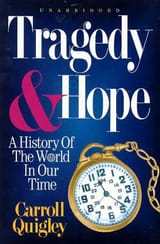Search Results
6/27/2025, 5:00:59 PM
This book does a good job in explaining cultural differences between Western Europe and the East (Eastern Europe, China, Russia), though that’s only a small portion of the book’s project. It’s gigantic and exhaustive. Here’s an excerpt on this specific topic:
“In the West, the Roman Empire disappeared in 476; and, although many efforts were made to revive it, there was clearly a period, about 900, when there was no empire, no state, and no public authority in the West. The state disappeared, yet society continued. So also, religious and economic life continued. This clearly showed that the state and society were not the same thing, that society was the basic entity, and that the state was a crowning, but not essential, cap to the social structure. This experience had revolutionary effects. It was discovered that man can live without a state; this became the basis of Western liberalism…
…In Rome, in Byzantium, and in Russia, law was regarded as an enactment of supreme power. In the West, when no supreme power existed, it was discovered that the law still existed as the body of rules which govern social life. Thus law was found by observation in the West, not enacted by autocracy as in the East.”
He elaborates on this argument to help explain economic and social differences between the two. It’s a fascinating read even if you don’t agree with it.
“In the West, the Roman Empire disappeared in 476; and, although many efforts were made to revive it, there was clearly a period, about 900, when there was no empire, no state, and no public authority in the West. The state disappeared, yet society continued. So also, religious and economic life continued. This clearly showed that the state and society were not the same thing, that society was the basic entity, and that the state was a crowning, but not essential, cap to the social structure. This experience had revolutionary effects. It was discovered that man can live without a state; this became the basis of Western liberalism…
…In Rome, in Byzantium, and in Russia, law was regarded as an enactment of supreme power. In the West, when no supreme power existed, it was discovered that the law still existed as the body of rules which govern social life. Thus law was found by observation in the West, not enacted by autocracy as in the East.”
He elaborates on this argument to help explain economic and social differences between the two. It’s a fascinating read even if you don’t agree with it.
Page 1
